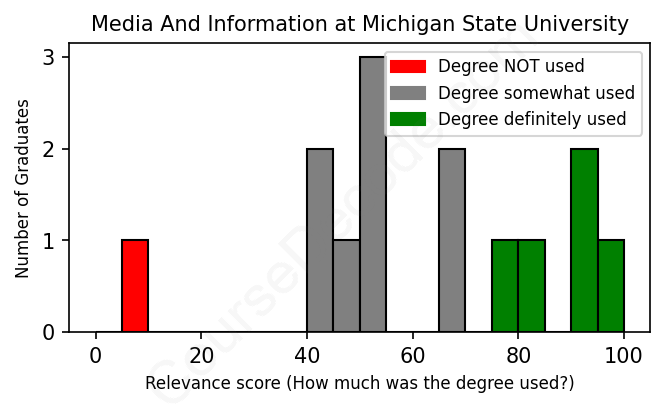
First, some facts. Of the Media And Information graduates from Michigan State University we've analyzed , here's how many have used (or NOT used) their degree in their career:

These are estimates based on AI analysis of 14 LinkedIn profiles (see below).
The verdict? Slightly below average. Overall, with an average relevance score of 62%, Media And Information graduates from Michigan State University have a slightly lower likelihood (-5%) of finding work in this field compared to the average graduate across all fields:
And for comparison, here's the chart for all profiles we've looked at across all degrees.
Also, after graduating, only 14% of these graduates have pursued further education other than another Bachelor's degree (such as a Masters degree or other), compared to the average across all profiles of 35%. This suggests a Bachelors degree is enough for most Media And Information graduates, and it's normal to look for work straight after graduation.
See the details:
|
Relevance score: 100% We think this person has gone into a career highly relevant to their degree. We think this person has gone into a career highly relevant to their degree.
DEGREE INFOGraduated in 2017 from Michigan State University with a Bachelor of Arts (BA) in Media And Information. No other secondary education since. JOB HISTORY SINCE GRADUATIONGraphic Designer and Videographer Michigan State's Unversity Office for Education Abroad Jan 2017 - Jan 2018 Design and Media Director  Abraham Aiyash Campaign Jan 2018 - Aug 2018 Senior Graphic Designer  Deliver Strategies Aug 2018 - Nov 2018 Graphic Designer  Spartan Motors, Inc. Nov 2018 - Dec 2019 Lead Graphic Designer  Abdullah Hammoud Mayoral Campaign Jan 2021 - Nov 2021 Visual Strategist  Stirred Stories May 2021 - Present Senior Graphic Designer  Deliver Strategies Jan 2020 - Present ABOUTGraphic design professional who uses outstanding technical skills, creativity, and a client-centered approach to produce compelling promotional materials and influence consumer engagement. |
The top 10 most common jobs done by the graduates we've analyzed (ranked most common to least) are:
When looking at job paths taken by graduates from the Media and Information program at Michigan State University, you’ll notice a pretty clear trend: many of them land roles directly tied to media production and communications. A big chunk of graduates have pursued jobs as videographers, production assistants, and even photojournalists, which makes sense since these roles leverage the skills they learned about media creation and storytelling during their studies. For instance, positions like Freelance Videographer and Photojournalist directly depend on those core competencies in video production, editing, and effective communication. It’s safe to say that a significant number of these jobs are closely related to the Media and Information field.
However, it’s important to note that not every job fits neatly into the media box. Some graduates find themselves in roles like web development or even customer service positions, which don’t draw as heavily on the media-specific skills they learned in college. For example, roles like Customer Success Manager or Marketing Coordinator use general communication and organizational skills but lack the creative media focus. Others, like Instructional Developer or Human Resource roles, may touch on communication aspects, yet they often steer away from direct media implementation. Overall, while many graduates are successfully applying their media knowledge in relevant jobs, a chunk of them are branching out into roles that don’t completely align with their degree, reflecting the broader job market's diversity.
Here is a visual representation of the most common words in job titles for Media And Information graduates (this is across all Media And Information graduates we've analyzed, not just those who went to Michigan State University):

When looking at the career trajectories of graduates from Michigan State University with a degree in Media and Information, it's clear that many have found their way into roles directly related to media production, journalism, and digital marketing. For instance, a typical first job after graduation often includes positions like Production Assistant or Video Production Intern, where they are able to hone their skills while gaining valuable industry experience. Over the course of 5 to 10 years, many appear to drift towards more specialized roles such as Photojournalist, Graphic Designer, or Video Editor. It seems that those who remain dedicated to the industry can carve out substantial careers that are quite relevant to their field of study.
However, it’s worth noting that there are also graduates who end up veering off the media path, taking jobs that don't seem directly related to Media and Information, such as Human Resources or Customer Success roles. This could be indicative of the broader job market, where graduates might take related positions initially before settling into roles that may not directly utilize their degree. Nevertheless, the majority of those who stick with media and production have managed to secure fulfilling careers that leverage their skills and education within the creative landscape. Ultimately, it looks like there's a mix of success stories, with plenty of people finding great jobs after their time at MSU, especially in media-focused roles.
Getting a Bachelor’s degree in Media and Information at Michigan State University can be a bit of a mixed bag, depending on your interests and strengths. If you’re into creativity, technology, and communication, you might find it pretty engaging and manageable. The coursework often combines theory and hands-on projects, which can make it feel less like a grind compared to more traditionally "academic" degrees. That said, there's definitely a good amount of reading, writing, and tech-based assignments, which might be challenging if those aren't your strong suits. Overall, it's not the easiest degree out there, but it’s also not among the toughest—just be ready to stay organized and bring your A-game!
Most commonly, in the LinkedIn profiles we've looked at, it takes people 4 years to finish a Bachelor degree in Media And Information.
Looking at the job histories of these Media and Information grads from Michigan State University, it seems like some are starting to land decent gigs while others are still finding their way. The ones who graduated a bit earlier, like in 2014 and 2016, have worked their way up in production and video editing roles, which typically pay better as you gain experience. However, many entry-level positions like production assistants and internships usually don’t pay much, so those early years might have been a struggle. It’s also clear that some, like the grad working as a Customer Success Manager or in digital marketing, are probably making a solid income now. But for others, like the recent grads just starting out or sticking to assistant roles in production and marketing, they might still be earning more of a starter salary. Overall, it looks mixed—some are on a solid path toward good money, but there are definitely others still climbing that ladder.
Here is a visual representation of the most common words seen in the "about" section of LinkedIn profiles who have a Bachelor degree in Media And Information (this is across all Media And Information graduates we've analyzed, not just those who went to Michigan State University). This may or may not be useful:

Here are all colleges offering a Bachelor degree in Media And Information (ordered by the average relevance score of their Media And Information graduates, best to worst) where we have analyzed at least 10 of their graduates:
| College | Score | Count |
|---|---|---|
 Michigan State University Michigan State University
|
62 | 14 |